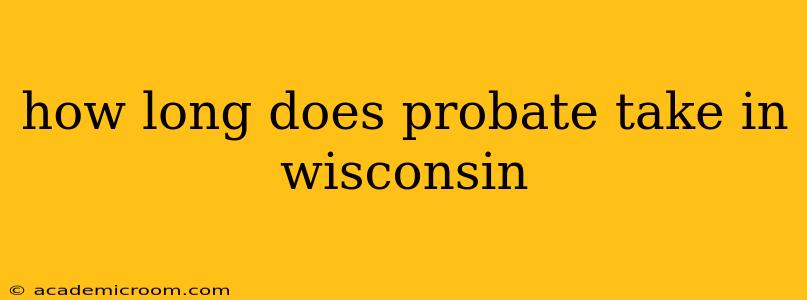Probate in Wisconsin, like in any state, can be a complex and time-consuming process. The length of time it takes to settle an estate varies significantly depending on several factors. There's no single definitive answer to "how long does probate take?", but understanding these influencing factors will give you a clearer picture of what to expect.
What Factors Influence Probate Time in Wisconsin?
Several key elements determine the duration of the probate process in Wisconsin:
-
Complexity of the Estate: A simple estate with few assets, straightforward will, and no contesting heirs will typically move through probate much faster than a complex estate with numerous assets (real estate, businesses, stocks, etc.), significant debts, and potential disputes among beneficiaries.
-
Cooperation of Heirs: If heirs cooperate and agree on the distribution of assets, the process is streamlined. Conversely, disagreements, challenges to the will, or missing heirs can significantly prolong the probate timeline.
-
Executor's Efficiency: The executor's (or personal representative's) competence and diligence directly impact the speed of probate. An efficient executor who acts promptly and follows proper procedures will expedite the process.
-
Court Backlog: Court backlogs vary by county. Some counties may have longer wait times for hearings and document processing than others.
-
Type of Probate Proceeding: Wisconsin offers different probate proceedings. A supervised administration involves more court oversight and typically takes longer than an unsupervised administration.
How Long Does Probate Typically Take in Wisconsin?
While there's no guaranteed timeframe, probate in Wisconsin generally takes anywhere from six months to a year or more. Simpler estates might conclude within six months, while complex estates could extend well beyond a year, sometimes even two or more years.
What if there's a will contest?
A will contest, where someone challenges the validity of the will, significantly increases the probate time. These cases can drag on for many months, or even years, depending on the complexity of the legal arguments and the court's schedule.
What about small estates?
Wisconsin offers simplified procedures for small estates, often called "small estate affidavits," which can significantly reduce the probate time. These procedures are designed for estates with assets valued below a certain threshold (currently, the amount is relatively low), eliminating the need for formal probate proceedings.
Frequently Asked Questions (PAAs)
Here are some frequently asked questions regarding probate in Wisconsin:
How long does it take to get a Wisconsin estate appraised?
The time required for an estate appraisal depends on the complexity and number of assets. Simple estates might receive appraisals within a few weeks, while more complex estates with numerous assets could take several months. The executor is responsible for securing the appraisal.
How long does it take to distribute assets after probate is closed?
Once the probate court approves the final accounting and closes the case, the distribution of assets to the beneficiaries can usually be completed within a few weeks to a couple of months. This timeline depends on factors such as the number of beneficiaries and the complexity of the assets.
What happens if there is no will in Wisconsin (intestacy)?
If someone dies without a will in Wisconsin, the state's intestacy laws dictate how the assets will be distributed. The process is still considered probate, but the rules are different and may influence the timeline. In general, intestacy cases can be just as complex as those with a will and may not necessarily be faster or slower.
Can I expedite the probate process in Wisconsin?
While you can't directly "speed up" probate, you can certainly minimize delays. This involves selecting a competent executor, gathering all necessary documentation promptly, cooperating with heirs, and working efficiently with the probate court.
This information is for general guidance only and should not be considered legal advice. Consult with a Wisconsin probate attorney for specific advice related to your situation. They can provide a more accurate estimate of the probate timeline based on your estate's unique circumstances.
